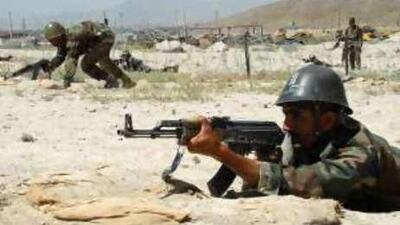KABUL // Just inside the entrance to the main training centre for the Afghan National Army, a Toyota Corolla lays abandoned, two bullet holes visible in its bonnet where US soldiers apparently opened fire on an innocent driver. As an unintended reminder of why so much emphasis is being put on bolstering the country's native military, it could not have been clearer. The sooner Afghanistan can defend itself, the sooner the foreign troops can leave.
"We have no good weapons, and we don't have enough armoured vehicles or body armour," said Col Mohammed Harun. "We have nothing, but our neighbours have everything, they even have nuclear weapons." More and more, Nato is keen to stress the Afghan National Army's (ANA) growing capabilities. With its own soldiers taking heavy casualties, and hostility to their presence here rising, a widespread transfer of power appears to be drawing closer.
The ANA is due to take responsibility for the capital's security this month. Meanwhile, Canada hopes to end combat operations in Kandahar in 2011 and let Afghan troops assume the role instead. Similar scenarios are expected in other provinces over coming years. But, like with so much else in this country, the reality on the ground might prove to be more complicated than the West wants to believe.
Morale among new recruits at the Kabul Military Training Centre appears to be mixed. While some men speak proudly of signing up to defend their homeland, others are there simply because they have nowhere else to go. Unemployment in Afghanistan is estimated to be around 50 per cent, and joining the army provides an opportunity to earn a living. "There are no jobs for lots of people. One way to find work is if you know somebody, another way is if you already have lots of money," said Jawid Farahmand, from the northern city of Mazar-i-Sharif.
"We have come here and now there is no way to escape. We can't say don't send me to this province or that province. Our survival is up to God." Fathay Shah, a new recruit from Nangarhar, compared life in the army unfavourably with his old job as a brickmaker in Peshawar, Pakistan. "This salary is not enough for my family," he said. "I am the one person who earns an income, and I cannot feed them."
The basic wage for soldiers in the ANA starts off at US$100 (Dh367) a month. They sign three-year contracts and can be sent anywhere in the country, unless, as one platoon sergeant said, they have connections in the government who can help them avoid Taliban-strongholds. Officials insist morale is good, but Afghan troops have been seen smoking drugs, refusing to follow orders and threatening to quit. Despite these problems, they are generally held in higher regard than the police. One American who worked as a mentor at the training centre privately agreed they were a little more professional.
"The problem is we are trying to build a relationship right now through the ANA with the [police] because there are kind of bad vibes between them," he said. "You've got to remember there is a lot of corruption on both sides, so that's another problem we try to work on." For all of the talk about the Afghan army's strength, there is clearly a long way to go before it will genuinely be ready to take on an insurgency that seems to get more sophisticated with each passing day. Hamid Karzai, the president, may speak publicly about sending troops across the border into Pakistan, but just a few hundred metres from where he lives, officials are more circumspect.
Major Gen Zahir Azimi, spokesman for the ministry of defence, complained that with around 75,000 soldiers now in the ANA, progress was taking too long. Although he declined to say how many soldiers would be needed for foreign troops to withdraw, he blamed low wages and a lack of basic equipment for hampering the attempts to reach that point. "Everything is changing very, very slowly, and we don't like this," he said.
@Email:csands@thenational.ae

